AWM137 2/2 - Historical information and general development of the RAAF Nursing Service - Letters and Histories for Press - Public Relations World War 2 - Part 6
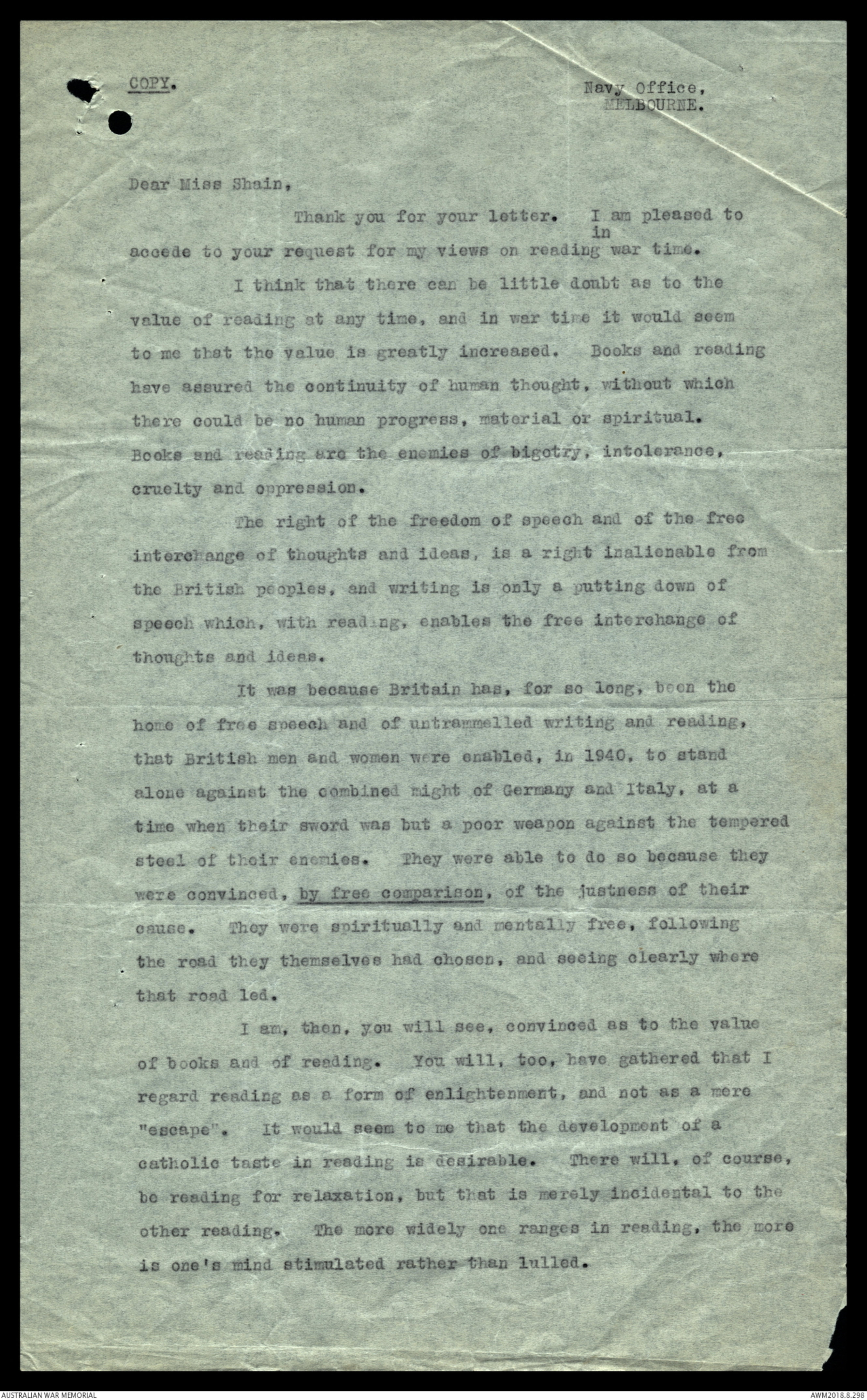
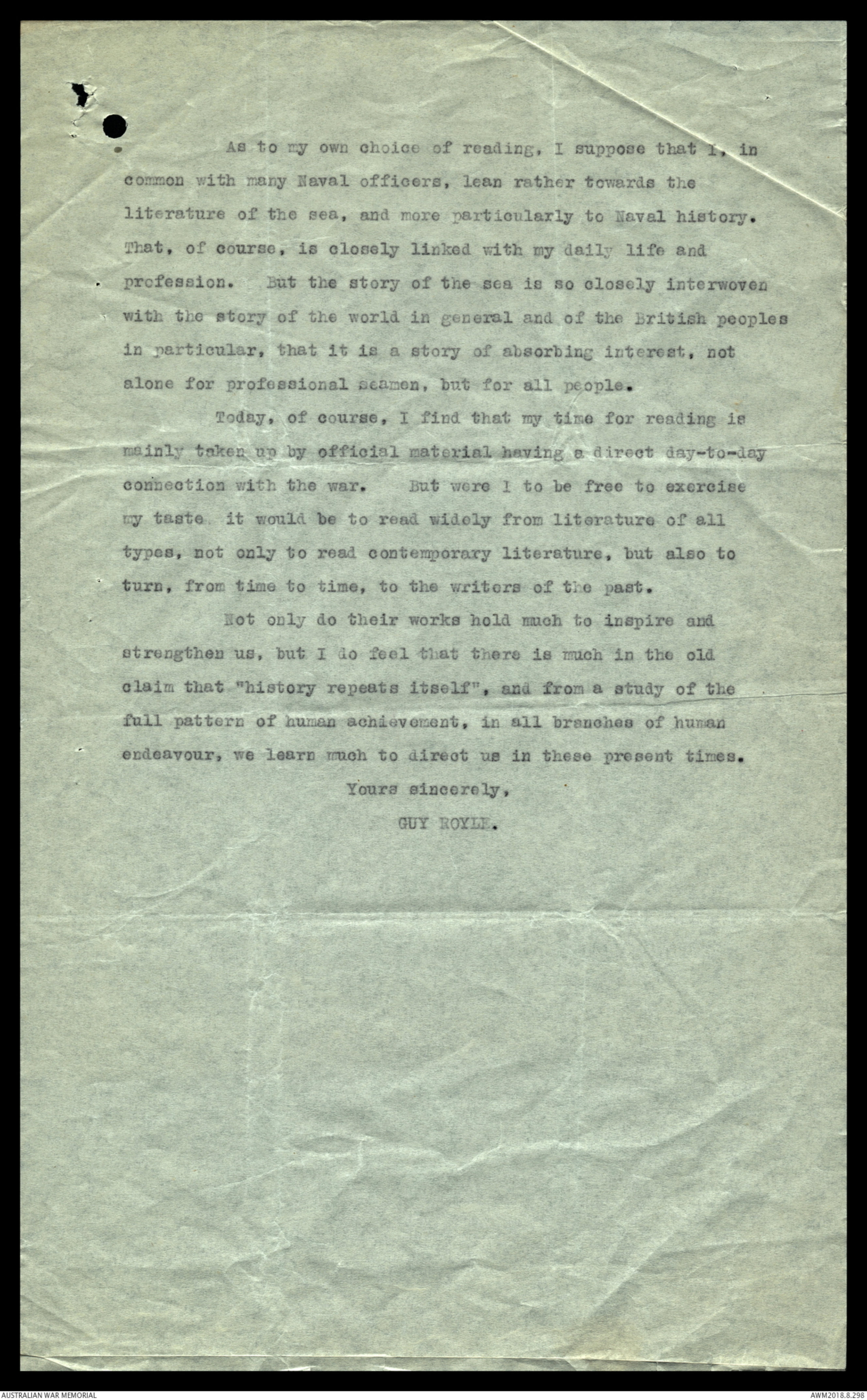
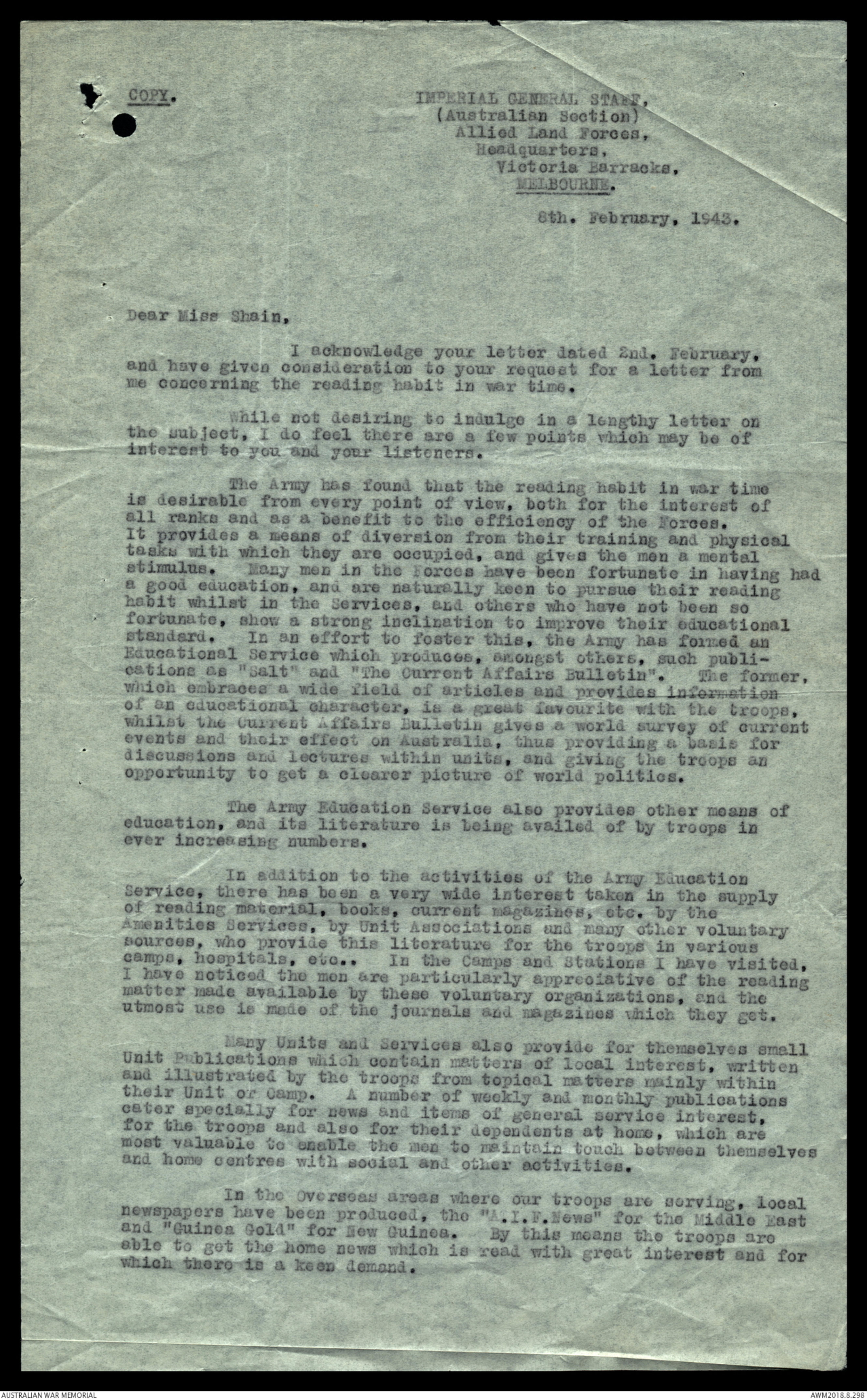
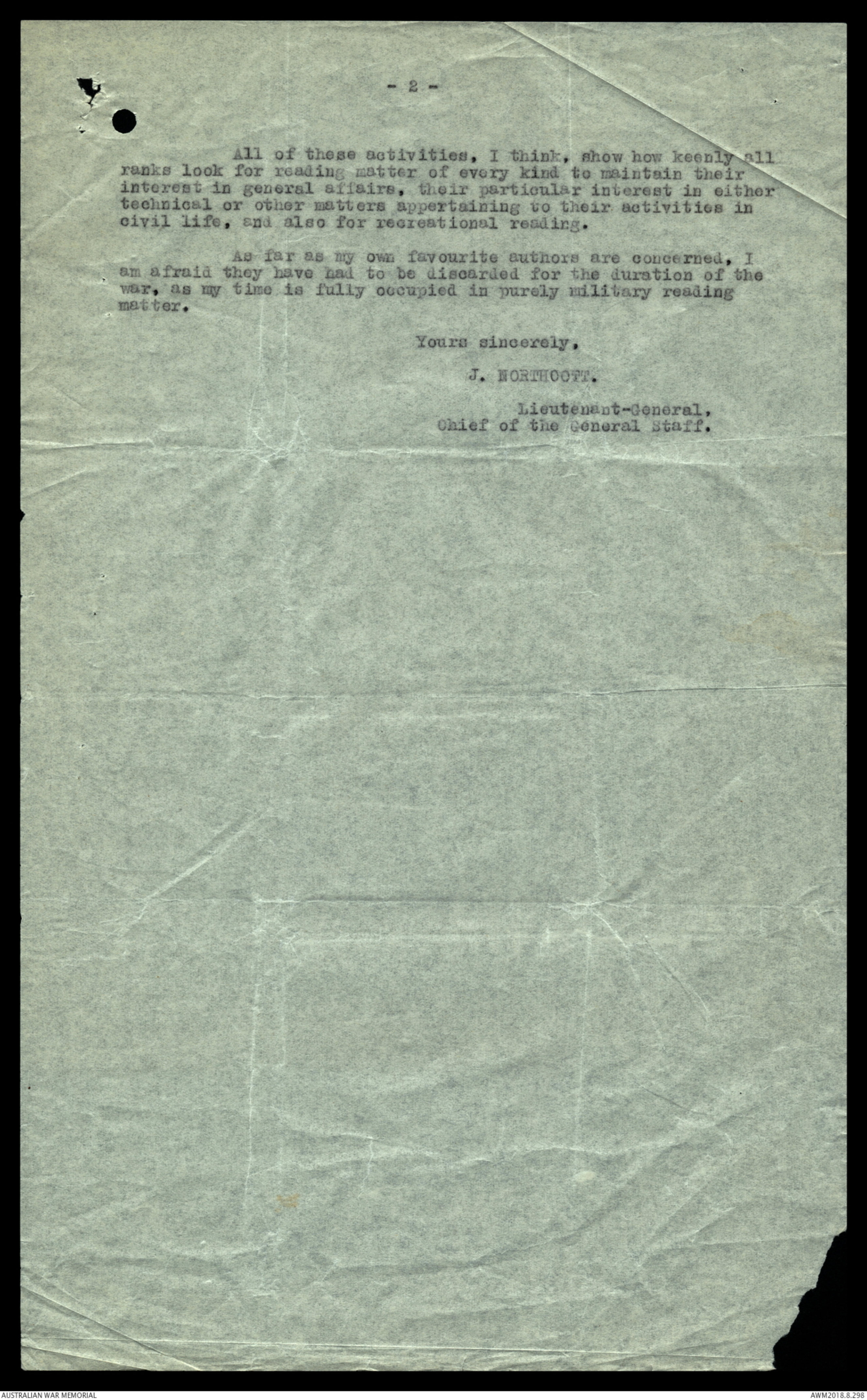
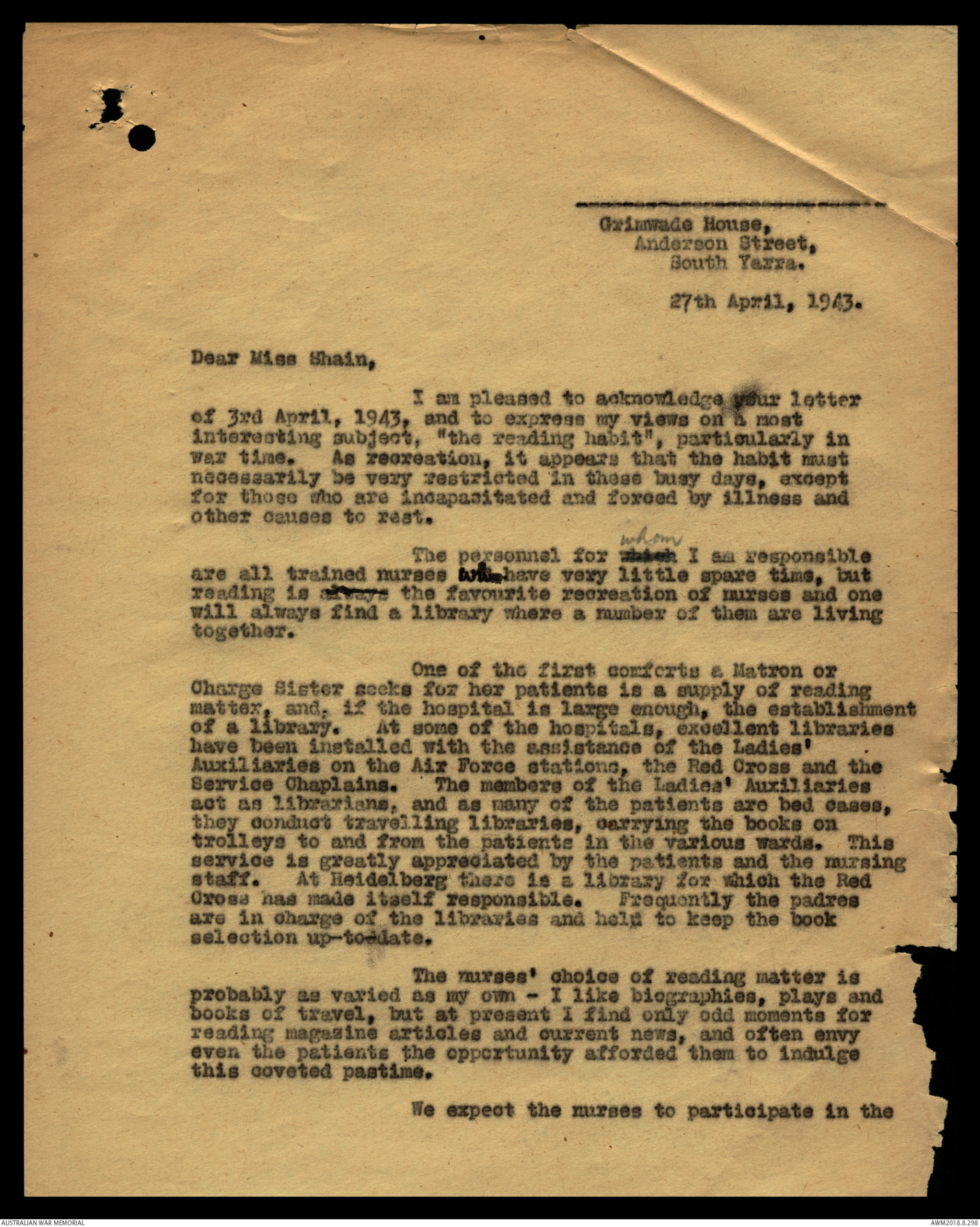
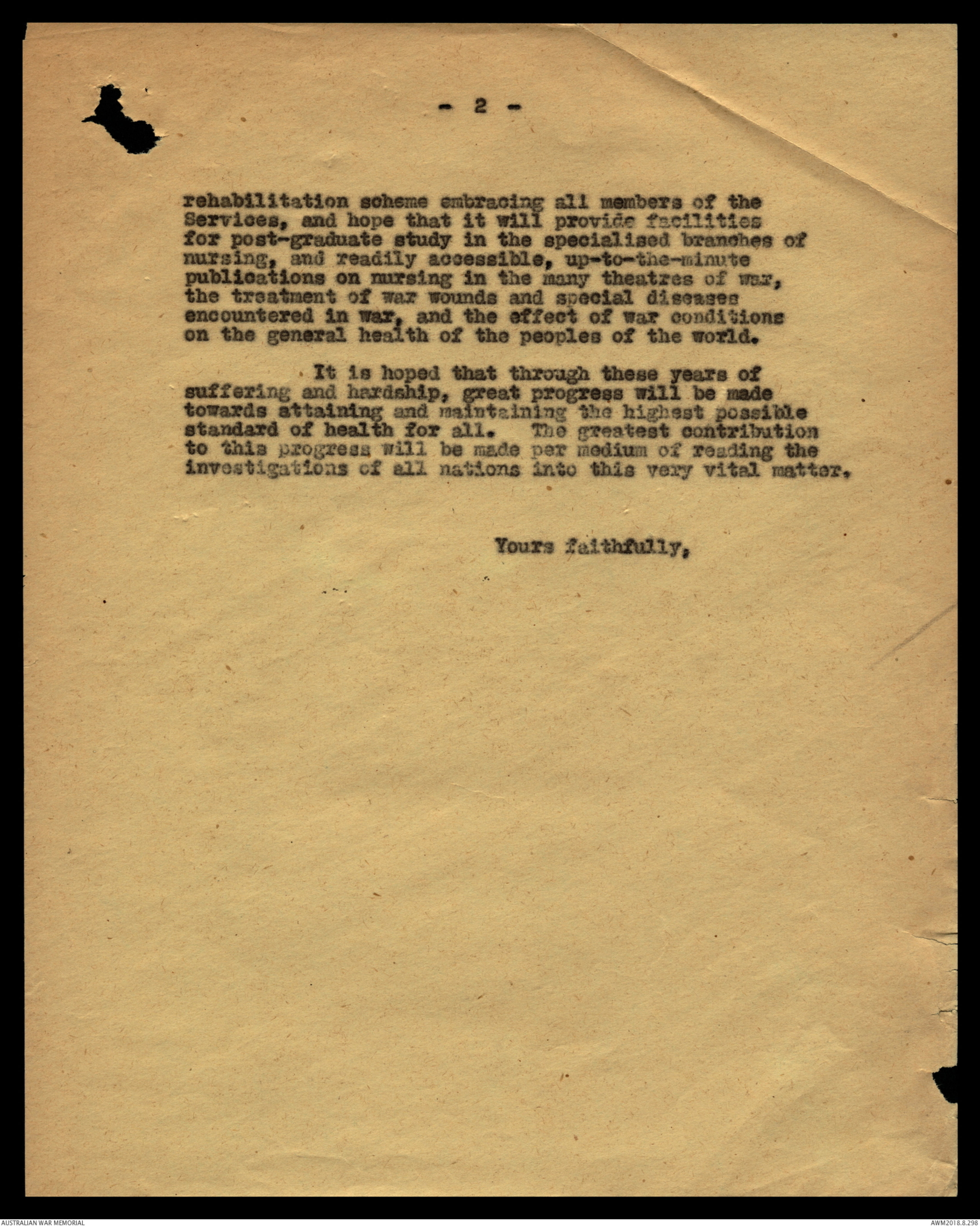
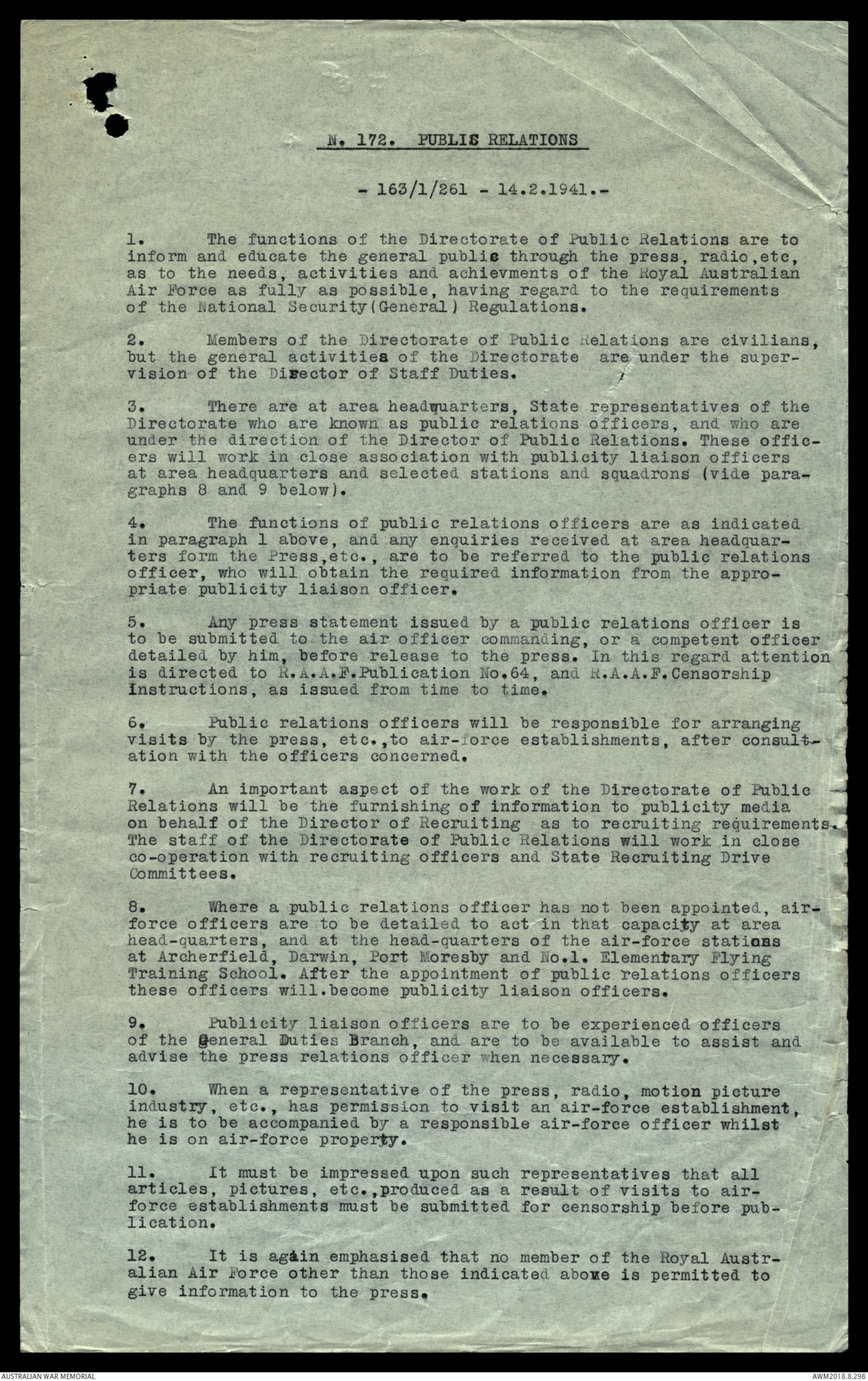
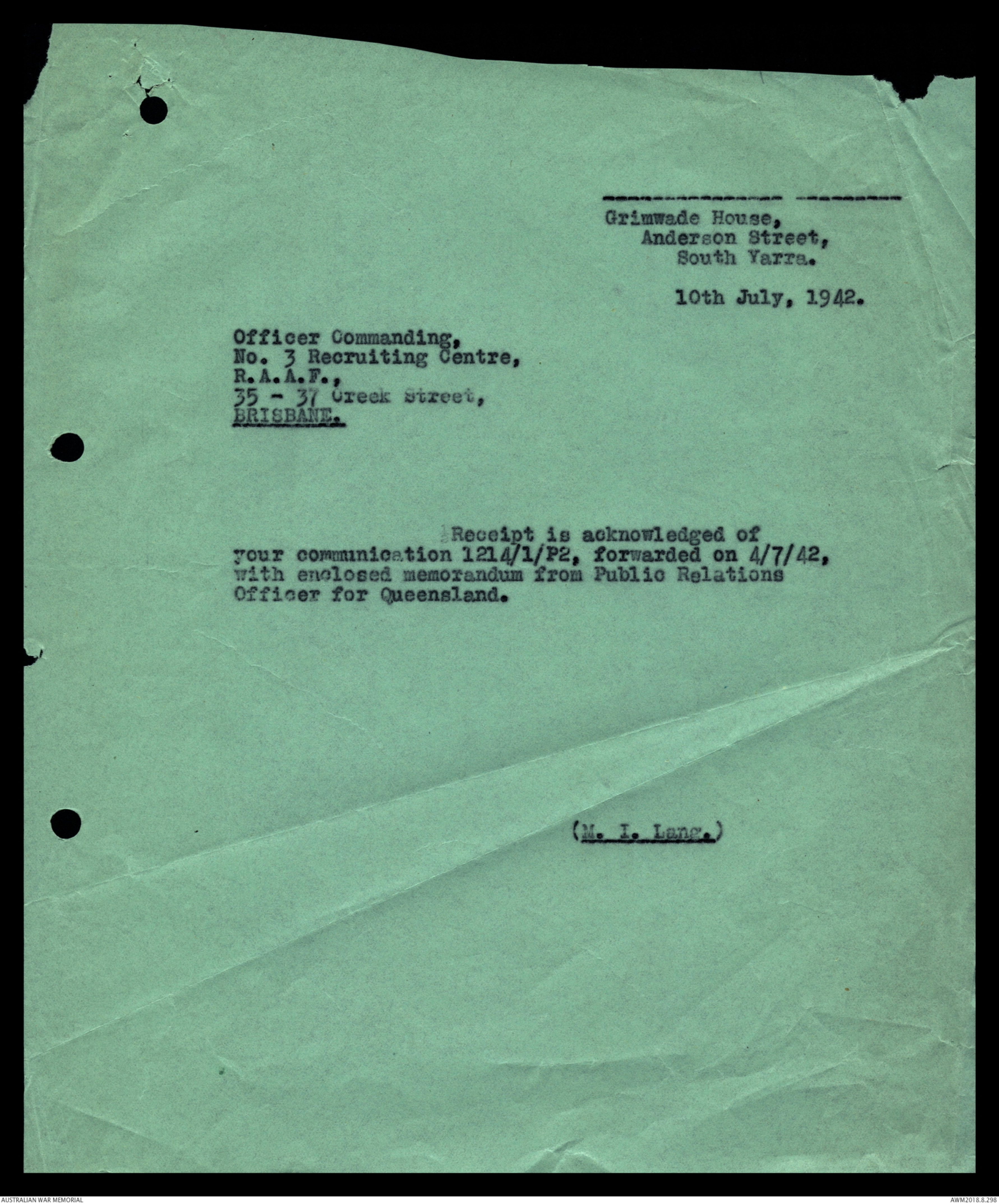
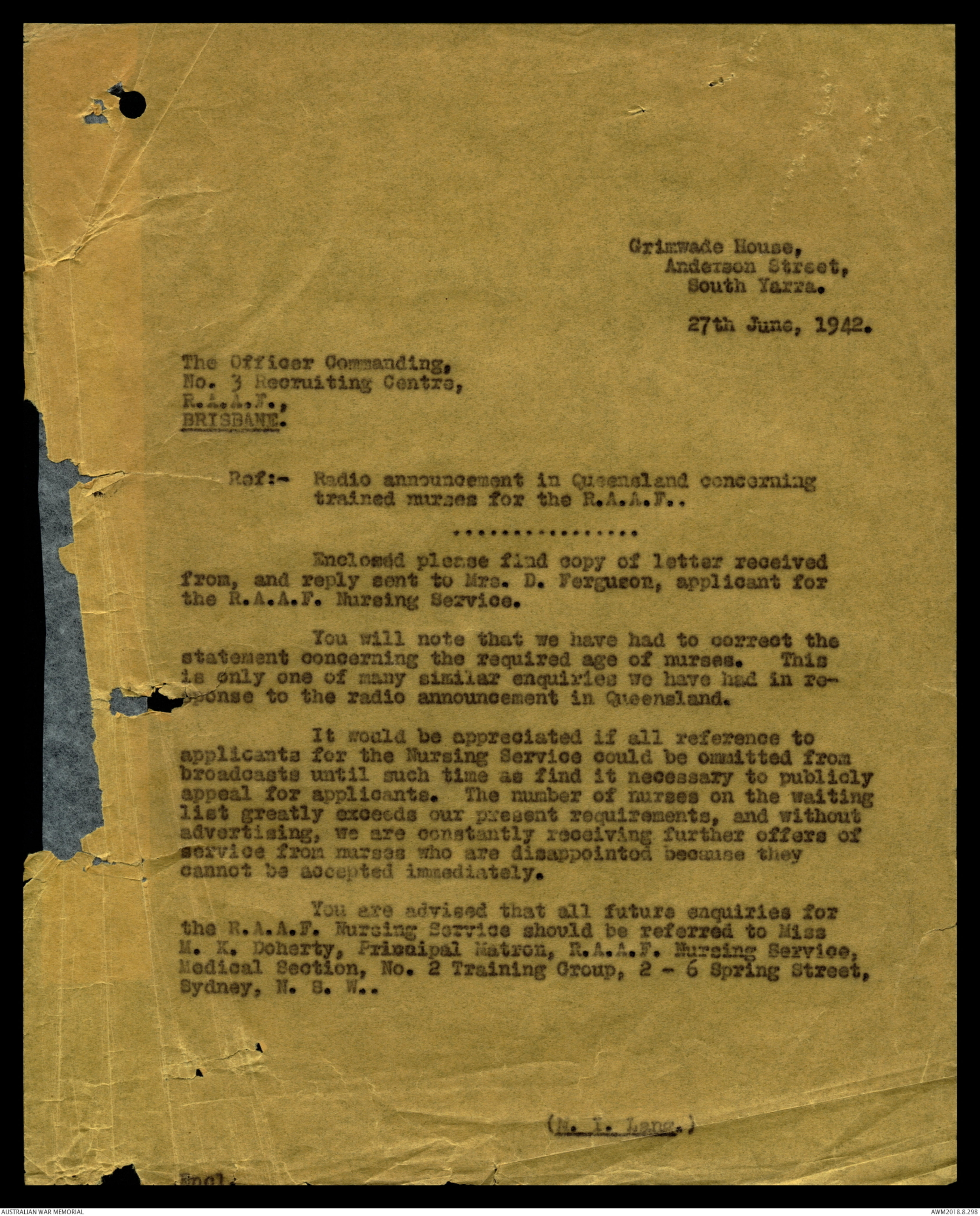
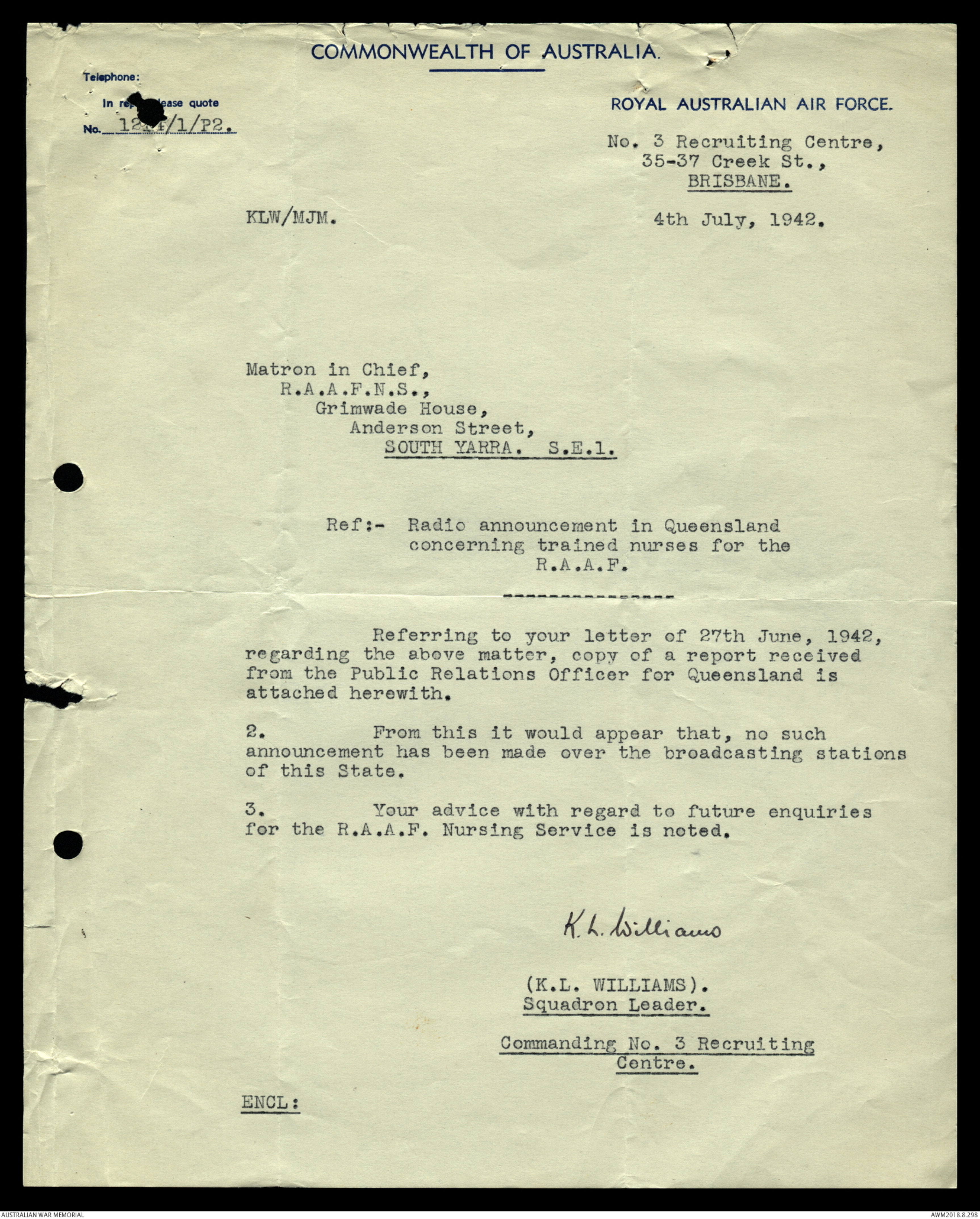
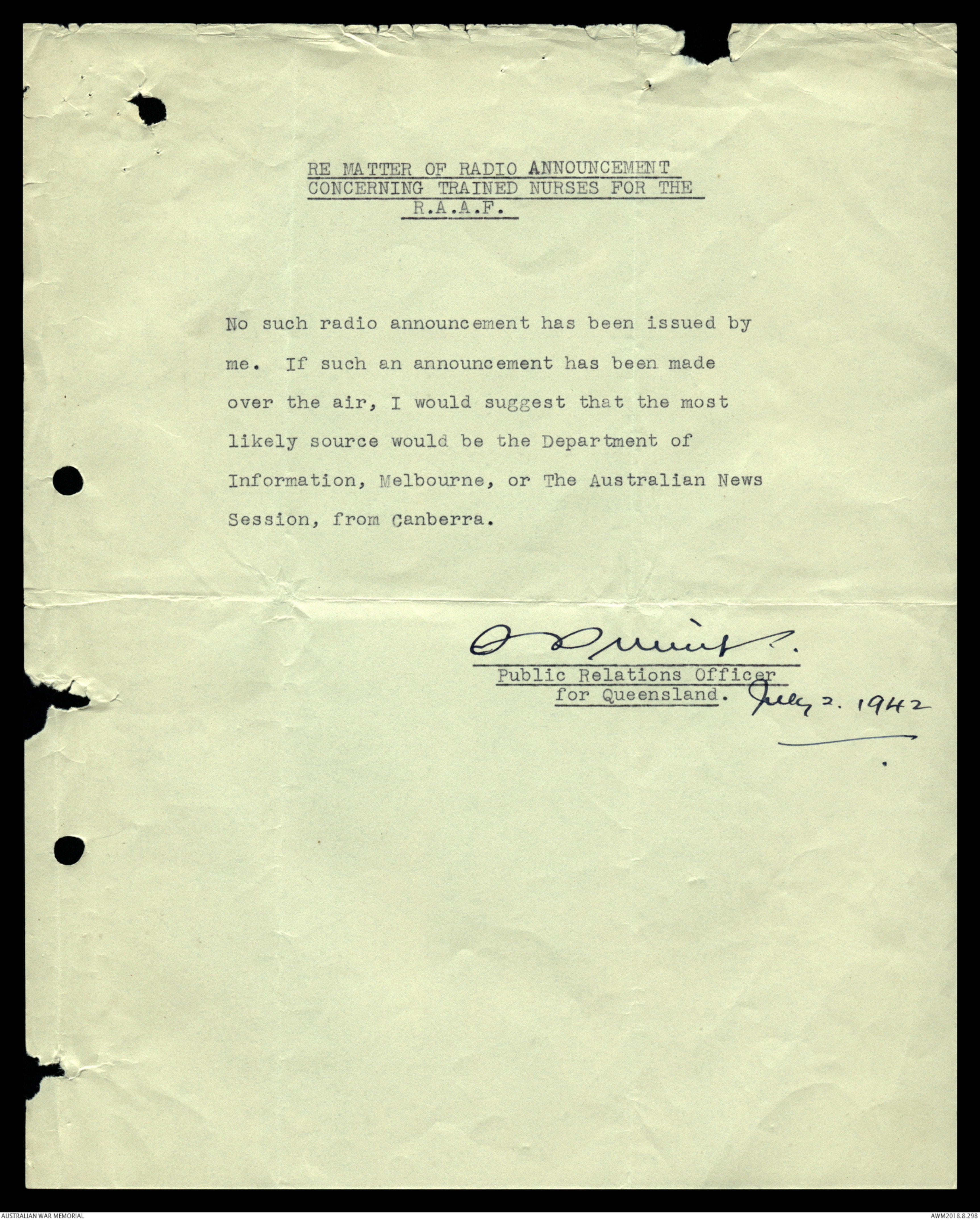
COPY.
Navy Office,
MELBOURNE.
Dear Miss Shain,
Thank you for your letter. I am pleased to
accede to your request for my views on reading ^in war time.
I think that there can be little doubt as to the
value of reading at any time, and in war time it would seem
to me that the value is greatly increased. Books and reading
have assured the continuity of human thought, without which
there could be no human progress, material or spiritual.
Books and reading are the enemies of bigotry, intolerance,
cruelty and oppression.
The right of the freedom of speech and of the free
interchange of thoughts and ideas, is a right inalienable from
the British peoples, and writing is only a putting down of
speech which, with reading, enables the free interchange of
thoughts and ideas.
It was because Britain has, for so long, been the
home of free speech and of untrammelled writing and reading,
that British men and women were enabled, in 1940, to stand
alone against the combined might of Germany and Italy, at a
time when their sword was but a poor weapon against the tempered
steel of their enemies. They were able to do so because they
were convinced, by free comparison, of the justness of their
cause. They were spiritually and mentally free, following
the road they themselves had chosen, and seeing clearly where
that road led.
I am then, you will see, convinced as to the value
of books and of reading. You will, too, have gathered that I
regard reading as a form of enlightenment, and not as a mere
"escape". It would seem to me that the development of a
catholic taste in reading is desirable. There will, of course,
be reading for relaxation, but that is merely incidental to the
other reading. The more widely one ranges in reading, the more
is one's mind stimulated rather than lulled.
As to my own choice of reading, I suppose that I, in
common with many Naval officers, lean rather towards the
literature of the sea, and more particularly to Naval history.
That, of course, is closely linked with my daily life and
profession. But the story of the sea is so closely interwoven
with the story of the world in general and of the British peoples
in particular, that it is a story of absorbing interest, not
alone for professional seamen, but for all people.
Today, of course, I find that my time for reading is
mainly taken up by official material having a direct day-to-day
connection with the war. But were I to be free to exercise
my taste it would be to read widely from literature of all
types, not only to read contemporary literature, but also to
turn, from time to time, to the writers of the past.
Not only do their works hold much to inspire and
strengthen us, but I do feel that there is much in the old
claim that "history repeats itself", and from a study of the
full pattern of human achievement, in all branches of human
endeavour, we learn much to direct us in these present times.
Yours sincerely,
GUY ROYLE.
COPY. IMPERIAL GENERAL STAFF,
(Australian Section)
Allied Land Forces,
Headquarters,
Victoria Barracks,
MELBOURNE.
8th. February, 1943.
Dear Miss Shain,
I acknowledge your letter dated 2nd. February,
and have given consideration to your request for a letter from
me concerning the reading habit in war time.
While not desiring to indulge in a lengthy letter on
the subject, I do feel there are a few points which may be of
interest to you and your listeners.
The Army has found that the reading habit in war time
is desirable from every point of view, both for the interest of
all ranks and as a benefit to the efficiency of the Forces.
It provides a means of diversion from their training and physical
tasks with which they are occupied, and gives the men a mental
stimulus. Many men in the Forces have been fortunate in having had
a good education, and are naturally keen to pursue their reading
habit whilst in the Services, and others who have not been so
fortunate, show a strong inclination to improve their educational
standard. In an effort to foster this, the Army has formed an
Educational Service which produces, amongst others, such publications
as "Salt" and "The Current Affairs Bulletin". The former,
which embraces a wide field of articles and provides information
of an educational character, is a great favourite with the troops,
whilst the Current Affairs Bulletin gives a world survey of current
events and their effect on Australia, thus providing a basis for
discussions and lectures within units, and giving the troops an
opportunity to get a clearer picture of world politics.
The Army Education Service also provides other means of
education, and its literature is being availed of by troops in
ever increasing numbers.
In addition to the activities of the Army Education
Service, there has been a very wide interest taken in the supply
of reading material, books, current magazines, etc, by the
Amenities Services, by Unit Associations and many other voluntary
sources, who provide this literature for the troops in various
camps, hospitals, etc.. In the Camps and Stations I have visited.
I have noticed the men are particularly appreciative of the reading
matter made available by these voluntary organizations, and the
utmost use is made of the journals and magazines which they get.
Many Units and Services also provide for themselves small
Unit Publications which contain matters of local interest, written
and illustrated by the troops from topical matters mainly within
their Unit or Camp. A number of weekly and monthly publications
cater specially for news and items of general service interest,
for the troops and also for their dependents at home, which are
most valuable to enable the men to maintain touch between themselves
and home centres with social and other activities.
In the Overseas areas where our troops are serving, local
newspapers have been produced, the "A.I.F.News" for the Middle East
and "Guinea Gold" for New Guinea. By this means the troops are
able to get the home news which is read with great interest and for
which there is a keen demand.
-2-
All of these activities, I think, show how keenly all
ranks look for reading matter of every kind to maintain their
interest in general affairs, their particular interest in either
technical or other matters appertaining to their activities in
civil life, and also for recreational reading.
As far as my own favourite authors are concerned, I
am afraid they have had to be discarded for the duration of the
war, as my time is fully occupied in purely military reading
matter.
Yours sincerely,
J. NORTHCOTT.
Lieutenant-General,
Chief of the General Staff.
Grimwade House,
Anderson Street,
South Yarra,
27th April, 1943.
Dear Miss Shain,
I am pleased to acknowledge your letter
of 3rd April, 1943, and to express my views on a most
interesting subject, "the reading habit", particularly in
war time. As recreation, it appears that the habit must
necessarily be very restricted in these busy days, except
for those who are incapacitated and forced by illness and
other causes to rest.
The personnel for which whom I am responsible
are all trained nurses who have very little spare time, but
reading is always the favourite recreation of nurses and one
will always find a library where a number of them are living
together.
One of the first comforts a Matron or
Charge Sister seeks for her patients is a supply of reading
matter, and, if the hospital is large enough, the establishment
of a library. At some of the hospitals, excellent libraries
have been installed with the assistance of the Ladies'
Auxiliaries on the Air Force stations, the Red Cross and the
Service Chaplains. The members of the Ladies' Auxiliaries
act as librarians, and as many of the patients are bed cases,
they conduct travelling libraries, carrying the books on
trolleys to and from the patients in the various wards. This
service is greatly appreciated by the patients and the nursing
staff. At Heidelberg there is a library for which the Red
Cross has made itself responsible. Frequently the padres
are in charge of the libraries and held to keep the book
selection up-to-date.
The nurses' choice of reading matter is
probably as varied as my own - I like biographies, plays and
books of travel, but at present I find only odd moments for
reading magazine articles and current news, and often envy
even the patients the opportunity afforded them to indulge
this coveted pastime.
We expect the nurses to participate in the
-2-
rehabilitation scheme embracing all members of the
Services, and hope that it will provide facilities
for post-graduate study in the specialised branches of
nursing, and readily accessible, up-to-the-minute
publications on nursing in the many theatres of war,
the treatment of war wounds and special diseases
encountered in war, and the effect of war conditions
on the general health of the peoples of the world.
It is hoped that through these years of
suffering and hardship, great progress will be made
towards attaining and maintaining the highest possible
standard of health for all. The greatest contribution
to this progress will be made per medium of reading the
investigations of all nations into this very vital matter.
Yours faithfully,
N. 172. PUBLIC RELATIONS
- 163/1/261 - 14.2.1941.-
1. The functions of the Directorate of Public Relations are to
inform and educate the general public through the press, radio, etc,
as to the needs, activities and achievments of the Royal Australian
Air Force as fully as possible, having regard to the requirements
of the National Security (General) Regulations.
2. Members of the Directorate of Public Relations are civilians,
but the general activities of the Directorate are under the supervision
of the Director of Staff Duties.
3. There are at area headquarters, State representatives of the
Directorate who are known as public relations officers, and who are
under the direction of the Director of Public Relations. These officers
will work in close association with publicity liaison officers
at area headquarters and selected stations and squadrons (vide paragraphs
8 and 9 below).
4. The functions of public relations officers are as indicated
in paragraph 1 above, and any enquiries received at area headquarters
form the Press, etc., are to be referred to the public relations
officer, who will obtain the required information from the appropriate
publicity liaison officer.
5. Any press statement issued by a public relations officer is
to be submitted to the air officer commanding, or a competent officer
detailed by him, before release to the press. In this regard attention
is directed to R.A.A.F. Publication No.64, and R.A.A.F.Censorship
Instructions, as issued from time to time.
6. Public relations officers will be responsible for arranging
visits by the press, etc., to air-force establishments, after consultation
with the officers concerned.
7. An important aspect of the work of the Directorate of Public
Relations will be the furnishing of information to publicity media
on behalf of the Director of Recruiting as to recruiting requirements.
The staff of the Directorate of Public Relations will work in close
co-operation with recruiting officers and State Recruiting Drive
Committees.
8. Where a public relations officer has not been appointed, air-force
officers are to be detailed to act in that capacity at area
head-quarters, and at the head-quarters of the air-force stations
at Archerfield, Darwin, Port Moresby and No.1. Elementary Flying
Training School. After the appointment of public relations officers
these officers will. become publicity liaison officers.
9. Publicity liaison officers are to be experienced officers
of the General Duties Branch, and are to be available to assist and
advise the press relations officer when necessary.
10. When a representative of the press, radio, motion picture
industry, etc., has permission to visit an air-force establishment,
he is to be accompanied by a responsible air-force officer whilst
he is on air-force property.
11. It must be impressed upon such representatives that all
articles, pictures, etc..produced as a result of visits to air-force
establishments must be submitted for censorship before publication.
12. It is again emphasised that no member of the Royal Australian
Air Force other than those indicated above is permitted to
give information to the press.
Grimwade House,
Anderson Street,
South Yarra.
10th July, 1942.
Officer Commanding,
No. 3 Recruiting Centre,
R.A.A.F.,
35 - 37 Creek Street,
BRISBANE.
Receipt is acknowledged of
your communication 1214/1/P2, forwarded on 4/7/42,
with enclosed memorandum from Public Relations
Officer for Queensland.
(M. I. Lang.)
Grimwade House,
Anderson Street,
South Yarra.
27th June, 1942.
The Officer Commanding,
No. 3 Recruiting Centre,
R.A.A.F.,
BRISBANE.
Ref:- Radio announcement in Queensland concerning
trained nurses for the R.A.A.F..
Enclosed please find copy of letter received
from, and reply sent to Mrs. D. Ferguson, applicant for
the R.A.A.F. Nursing Service.
You will note that we have had to correct the
statement concerning the required age of nurses. This
is only one of many similar enquiries we have had in response
to the radio announcement in Queensland.
It would be appreciated if all reference to
applicants for the Nursing Service could be ommitted from
broadcasts until such time as find it necessary to publicly
appeal for applicants. The number of nurses on the waiting
list greatly exceeds our present requirements, and without
advertising, we are constantly receiving further offers of
service from nurses who are disappointed because they
cannot be accepted immediately.
You are advised that all future enquiries for
the R.A.A.F. Nursing Service should be referred to Miss
M.K. Doherty, Principal Matron, R.A.A.F. Nursing Service,
Medical Section, No. 2 Training Group, 2- 6 Spring Street,
Sydney, N.S.W..
(M .I. Lang.)
COMMONWEALTH OF AUSTRALIA.
Telephone:
In reply please quote
No. 1214/1/P2.
ROYAL AUSTRALIAN AIR FORCE.
No. 3 Recruiting Centre,
35-37 Creek St.,
BRISBANE.
KLW/MJM.
4th July, 1942.
Matron in Chief,
R.A.A.F.N.S.,
Grimwade House,
Anderson Street,
SOUTH YARRA. S.E.1.
Ref:- Radio announcement in Queensland
concerning trained nurses for the
R.A.A.F.
Referring to your letter of 27th June, 1942,
regarding the above matter, copy of a report received
from the Public Relations Officer for Queensland is
attached herewith.
2. From this it would appear that, no such
announcement has been made over the broadcasting stations
of this State.
3. Your advice with regard to future enquiries
for the R.A.A.F. Nursing Service is noted.
K.L.Williams
(K.L. WILLIAMS).
Squadron Leader.
Commanding No. 3 Recruiting
Centre.
ENCL:
RE MATTER OF RADIO ANNOUNCEMENT
CONCERNING TRAINED NURSES FOR THE
R.A.A.F.
No such radio announcement has been issued by
me. If such an announcement has been made
over the air, I would suggest that the most
likely source would be the Department of
Information, Melbourne, or The Australian News
Session, from Canberra.
[[?]]
Public Relations Officer
for Queensland. July 2.1942.
 Not Yet Replaced By AI
Not Yet Replaced By AIThis transcription item is now locked to you for editing. To release the lock either Save your changes or Cancel.
This lock will be automatically released after 60 minutes of inactivity.